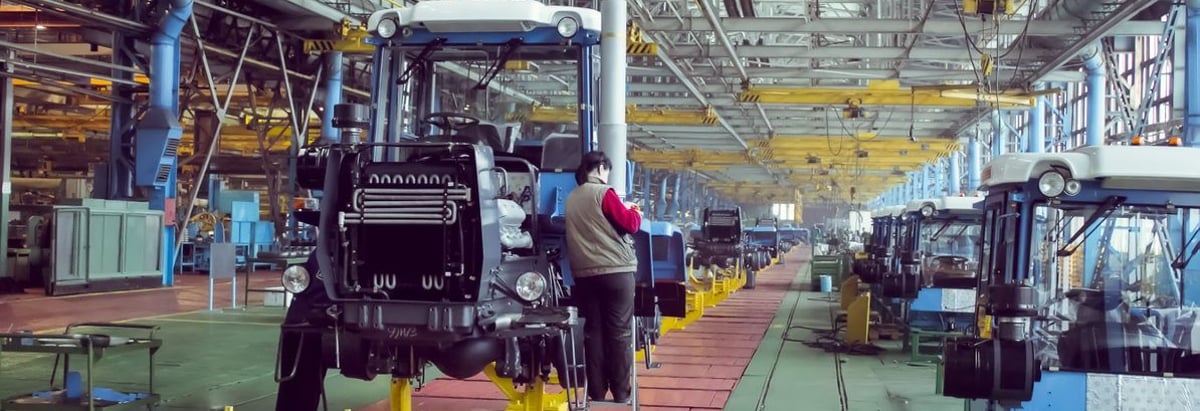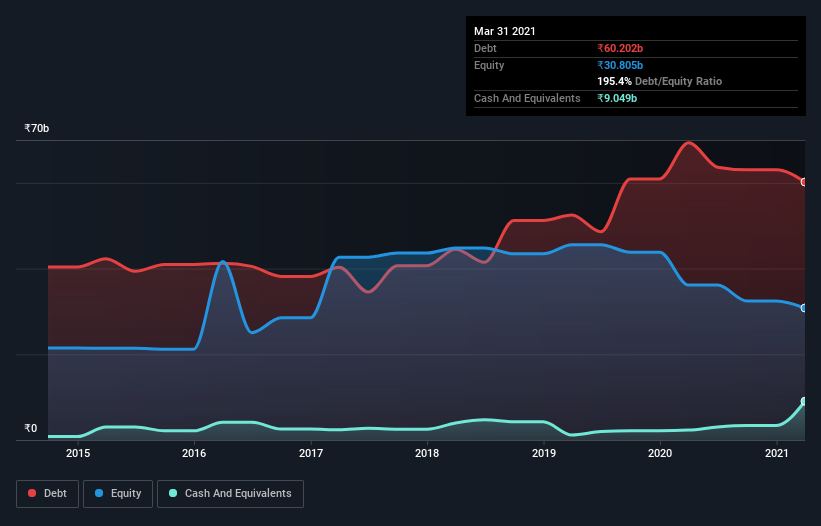Is Jain Irrigation Systems (NSE:JISLDVREQS) Using Debt In A Risky Way?

Howard Marks put it nicely when he said that, rather than worrying about share price volatility, 'The possibility of permanent loss is the risk I worry about... and every practical investor I know worries about.' So it seems the smart money knows that debt - which is usually involved in bankruptcies - is a very important factor, when you assess how risky a company is. We can see that Jain Irrigation Systems Limited (NSE:JISLDVREQS) does use debt in its business. But is this debt a concern to shareholders?
When Is Debt Dangerous?
Debt is a tool to help businesses grow, but if a business is incapable of paying off its lenders, then it exists at their mercy. If things get really bad, the lenders can take control of the business. However, a more frequent (but still costly) occurrence is where a company must issue shares at bargain-basement prices, permanently diluting shareholders, just to shore up its balance sheet. By replacing dilution, though, debt can be an extremely good tool for businesses that need capital to invest in growth at high rates of return. When we think about a company's use of debt, we first look at cash and debt together.
View our latest analysis for Jain Irrigation Systems
What Is Jain Irrigation Systems's Debt?
As you can see below, Jain Irrigation Systems had ₹60.2b of debt at March 2021, down from ₹69.4b a year prior. On the flip side, it has ₹9.05b in cash leading to net debt of about ₹51.2b.

How Strong Is Jain Irrigation Systems' Balance Sheet?
Zooming in on the latest balance sheet data, we can see that Jain Irrigation Systems had liabilities of ₹67.9b due within 12 months and liabilities of ₹28.1b due beyond that. Offsetting this, it had ₹9.05b in cash and ₹25.4b in receivables that were due within 12 months. So it has liabilities totalling ₹61.6b more than its cash and near-term receivables, combined.
The deficiency here weighs heavily on the ₹16.5b company itself, as if a child were struggling under the weight of an enormous back-pack full of books, his sports gear, and a trumpet. So we definitely think shareholders need to watch this one closely. At the end of the day, Jain Irrigation Systems would probably need a major re-capitalization if its creditors were to demand repayment. There's no doubt that we learn most about debt from the balance sheet. But it is Jain Irrigation Systems's earnings that will influence how the balance sheet holds up in the future. So when considering debt, it's definitely worth looking at the earnings trend. Click here for an interactive snapshot.
In the last year Jain Irrigation Systems had a loss before interest and tax, and actually shrunk its revenue by 8.8%, to ₹57b. That's not what we would hope to see.
Caveat Emptor
Importantly, Jain Irrigation Systems had an earnings before interest and tax (EBIT) loss over the last year. To be specific the EBIT loss came in at ₹28m. If you consider the significant liabilities mentioned above, we are extremely wary of this investment. That said, it is possible that the company will turn its fortunes around. But we think that is unlikely since it is low on liquid assets, and made a loss of ₹3.6b in the last year. So we think this stock is quite risky. We'd prefer to pass. When analysing debt levels, the balance sheet is the obvious place to start. However, not all investment risk resides within the balance sheet - far from it. These risks can be hard to spot. Every company has them, and we've spotted 2 warning signs for Jain Irrigation Systems (of which 1 is a bit unpleasant!) you should know about.
If you're interested in investing in businesses that can grow profits without the burden of debt, then check out this free list of growing businesses that have net cash on the balance sheet.
If you decide to trade Jain Irrigation Systems, use the lowest-cost* platform that is rated #1 Overall by Barron’s, Interactive Brokers. Trade stocks, options, futures, forex, bonds and funds on 135 markets, all from a single integrated account. Promoted
If you're looking to trade Jain Irrigation Systems, open an account with the lowest-cost platform trusted by professionals, Interactive Brokers.
With clients in over 200 countries and territories, and access to 160 markets, IBKR lets you trade stocks, options, futures, forex, bonds and funds from a single integrated account.
Enjoy no hidden fees, no account minimums, and FX conversion rates as low as 0.03%, far better than what most brokers offer.
Sponsored ContentNew: Manage All Your Stock Portfolios in One Place
We've created the ultimate portfolio companion for stock investors, and it's free.
• Connect an unlimited number of Portfolios and see your total in one currency
• Be alerted to new Warning Signs or Risks via email or mobile
• Track the Fair Value of your stocks
This article by Simply Wall St is general in nature. It does not constitute a recommendation to buy or sell any stock, and does not take account of your objectives, or your financial situation. We aim to bring you long-term focused analysis driven by fundamental data. Note that our analysis may not factor in the latest price-sensitive company announcements or qualitative material. Simply Wall St has no position in any stocks mentioned.
*Interactive Brokers Rated Lowest Cost Broker by StockBrokers.com Annual Online Review 2020
Have feedback on this article? Concerned about the content? Get in touch with us directly. Alternatively, email editorial-team (at) simplywallst.com.
About NSEI:JISLDVREQS
Jain Irrigation Systems
Manufactures and sells micro-irrigation systems in India, Europe, North America, and internationally.
Acceptable track record with mediocre balance sheet.
Market Insights
Community Narratives



